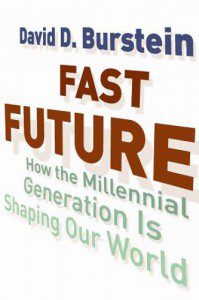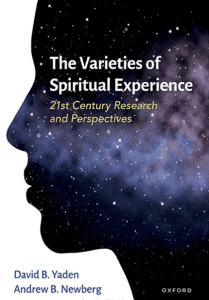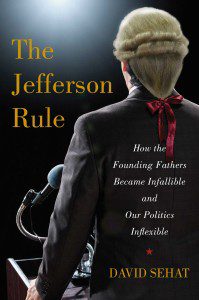“Seventh-Generation Thinking” means considering the longterm impact of our actions even to the seventh generation to follow. Or I have sometimes heard this perspective phrased: seeing yourself as in the midpoint of a seven-generation span — such that ethical decisions should try to honor the wisdom of the three generations that preceded you (back to your great-grandparents) and to consider the legacy you are leaving for the three generations that will follow you (your great-grand children).
One issue is that generational research reminds us of how differently each succeeding generation sees the world, so how do we keep up? One of the tools I have found regularly helpful in shifting my perspective is the “Mindset List,” which is released every August by Beloit College to help professors “be aware of dated references.” The most recent Mindset List included 60 “cultural touchstones that shape the lives of students entering college,” but I’ll share only a few of them: For current college freshmen, keep in mind that:
- Eminem and LL Cool J could show up at parents’ weekend.
- GM means food that is Genetically Modified.
- As kids they may well have seen Chicken Run but probably never got chicken pox.
- Having a chat has seldom involved talking.
- Gaga has never been baby talk.
- They have known only two presidents.
- Threatening to shut down the government during Federal budget negotiations has always been an anticipated tactic.
- With GPS, they have never needed directions to get someplace, just an address.
- They have never attended a concert in a smoke-filled arena.
- Their favorite feature films have always been largely, if not totally, computer generated.
- Their parents’ car CD player is soooooo ancient and embarrassing.
For myself, at age 36, I’m twice as old as our recent eighteen-year-old high school graduates. And generationally, I am part of the tail end of Generation X, having been born in 1978, the year after Star Wars came out.
Most recent high school graduates were born around 1996, and are solidly in the middle of Generation Y, also know as the “Millennial Generation.” But, Millenials, don’t get too cocky about your youth, Generation Z is coming for you. Gen Z is the first generation that will be fully digital natives, growing up never knowing a world without smart phones and tablet computers. As David Burstein writes about in his important new book Fast Future: How the Millennial Generation Is Shaping Our World, the rest of us, even recent high school graduates, are “digital immigrants” (56-57). But Generation Z will never know a print edition of the Encyclopedia Britannica — only Wikipedia (86). And Gen Z will also never know a world in which only white men can be President.
know as the “Millennial Generation.” But, Millenials, don’t get too cocky about your youth, Generation Z is coming for you. Gen Z is the first generation that will be fully digital natives, growing up never knowing a world without smart phones and tablet computers. As David Burstein writes about in his important new book Fast Future: How the Millennial Generation Is Shaping Our World, the rest of us, even recent high school graduates, are “digital immigrants” (56-57). But Generation Z will never know a print edition of the Encyclopedia Britannica — only Wikipedia (86). And Gen Z will also never know a world in which only white men can be President.
To consider my own religious denomination of Unitarian Universalism through the lens of generational theory, the merger of the American Unitarian Association and the Universalist Church of America into Unitarian Universalism happened in 1961. And in many ways the predominant UUism most of us know has been heavily influenced by the Baby Boomers, who came of age in the 60s and 70s. Perhaps significantly, some demographers see the Millennials as an “echo boom,” because many of them are the children of Boomer parents (xv): “Worldwide, there are 1.7 billion Millennials — almost one-third of the people on earth” (xvi). So it is fascinating to watch the evolution from Boomer Unitarian Universalism to Gen-X into Millennial-influenced UUism and beyond.
For most Millennials, the defining event of their early lives were the terrorist attacks of September 11, 2001. And as a generation deeply shaped by social media, they have also grown up knowing both the promise and perils of an increasingly globalized and interdependent world. One piece of advice, I would offer our graduates is to not only leverage technology to stay connected and create social change, but also to find times and places in which you can embrace the luxury of unplugging from technology to be fully present to the world without the filter of technology. As a recent article by Eugeny Morozov in the summer 2014 Geez Magazine challenged me, “Why we disconnect matters: We can continue in today’s mode of treating disconnection as a way to recharge and regain productivity, or we can view it as a way to sabotage the addiction tactics of the acceleration-distraction complex that is Silicon Valley” (23).
Relatedly, I’ll move toward my conclusion by quoting State Representative Boyd Brown, a Millennial elected to the State house in my home state of South Carolina:
My generation acknowledges science, and we want to protect our planet…. My generation does not hate gay people. We don’t hate any people…. My generation does not fear the future…. We welcome change. And, ladies and gentlemen, as a word of caution to you, my generation is sprinting this way. (124)
May it be so.
The Rev. Dr. Carl Gregg is a trained spiritual director, a D.Min. graduate of San Francisco Theological Seminary, and the minister of the Unitarian Universalist Congregation of Frederick, Maryland. Follow him on Facebook (facebook.com/carlgregg) and Twitter (@carlgregg).
Learn more about Unitarian Universalism:
http://www.uua.org/beliefs/principles












